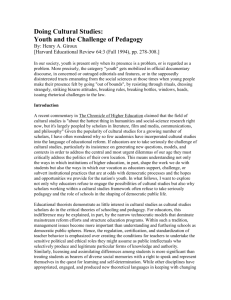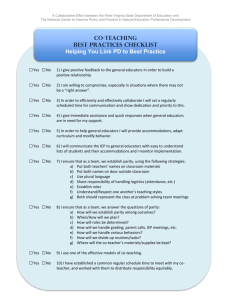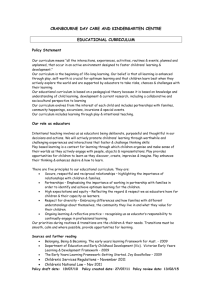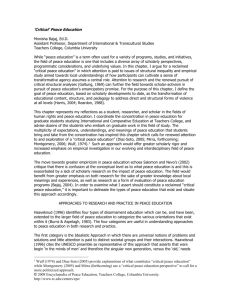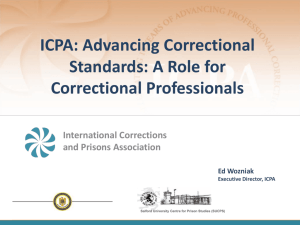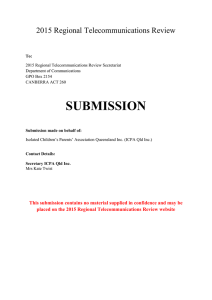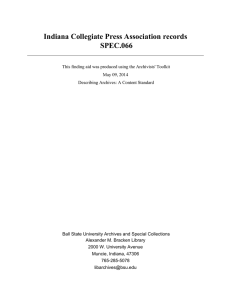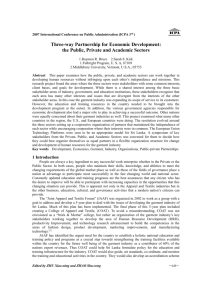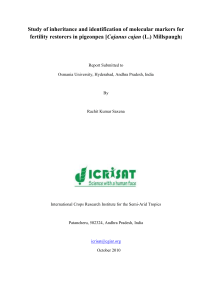Reviewer`s Comments on Accounting for Apocalypse: An
advertisement
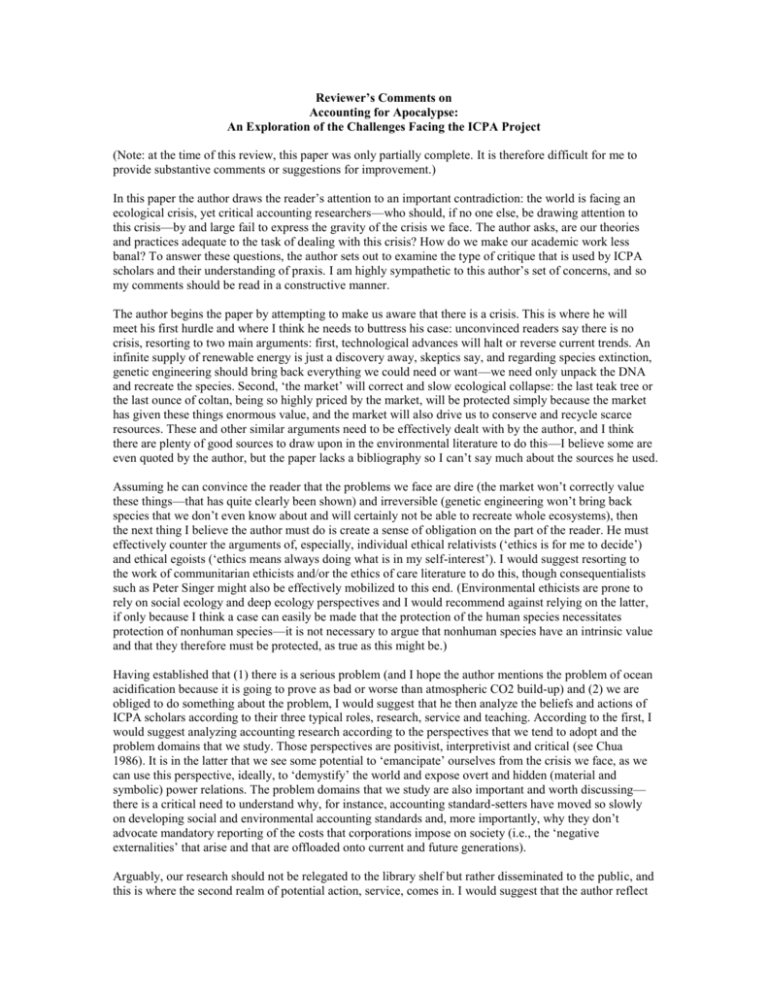
Reviewer’s Comments on Accounting for Apocalypse: An Exploration of the Challenges Facing the ICPA Project (Note: at the time of this review, this paper was only partially complete. It is therefore difficult for me to provide substantive comments or suggestions for improvement.) In this paper the author draws the reader’s attention to an important contradiction: the world is facing an ecological crisis, yet critical accounting researchers—who should, if no one else, be drawing attention to this crisis—by and large fail to express the gravity of the crisis we face. The author asks, are our theories and practices adequate to the task of dealing with this crisis? How do we make our academic work less banal? To answer these questions, the author sets out to examine the type of critique that is used by ICPA scholars and their understanding of praxis. I am highly sympathetic to this author’s set of concerns, and so my comments should be read in a constructive manner. The author begins the paper by attempting to make us aware that there is a crisis. This is where he will meet his first hurdle and where I think he needs to buttress his case: unconvinced readers say there is no crisis, resorting to two main arguments: first, technological advances will halt or reverse current trends. An infinite supply of renewable energy is just a discovery away, skeptics say, and regarding species extinction, genetic engineering should bring back everything we could need or want—we need only unpack the DNA and recreate the species. Second, ‘the market’ will correct and slow ecological collapse: the last teak tree or the last ounce of coltan, being so highly priced by the market, will be protected simply because the market has given these things enormous value, and the market will also drive us to conserve and recycle scarce resources. These and other similar arguments need to be effectively dealt with by the author, and I think there are plenty of good sources to draw upon in the environmental literature to do this—I believe some are even quoted by the author, but the paper lacks a bibliography so I can’t say much about the sources he used. Assuming he can convince the reader that the problems we face are dire (the market won’t correctly value these things—that has quite clearly been shown) and irreversible (genetic engineering won’t bring back species that we don’t even know about and will certainly not be able to recreate whole ecosystems), then the next thing I believe the author must do is create a sense of obligation on the part of the reader. He must effectively counter the arguments of, especially, individual ethical relativists (‘ethics is for me to decide’) and ethical egoists (‘ethics means always doing what is in my self-interest’). I would suggest resorting to the work of communitarian ethicists and/or the ethics of care literature to do this, though consequentialists such as Peter Singer might also be effectively mobilized to this end. (Environmental ethicists are prone to rely on social ecology and deep ecology perspectives and I would recommend against relying on the latter, if only because I think a case can easily be made that the protection of the human species necessitates protection of nonhuman species—it is not necessary to argue that nonhuman species have an intrinsic value and that they therefore must be protected, as true as this might be.) Having established that (1) there is a serious problem (and I hope the author mentions the problem of ocean acidification because it is going to prove as bad or worse than atmospheric CO2 build-up) and (2) we are obliged to do something about the problem, I would suggest that he then analyze the beliefs and actions of ICPA scholars according to their three typical roles, research, service and teaching. According to the first, I would suggest analyzing accounting research according to the perspectives that we tend to adopt and the problem domains that we study. Those perspectives are positivist, interpretivist and critical (see Chua 1986). It is in the latter that we see some potential to ‘emancipate’ ourselves from the crisis we face, as we can use this perspective, ideally, to ‘demystify’ the world and expose overt and hidden (material and symbolic) power relations. The problem domains that we study are also important and worth discussing— there is a critical need to understand why, for instance, accounting standard-setters have moved so slowly on developing social and environmental accounting standards and, more importantly, why they don’t advocate mandatory reporting of the costs that corporations impose on society (i.e., the ‘negative externalities’ that arise and that are offloaded onto current and future generations). Arguably, our research should not be relegated to the library shelf but rather disseminated to the public, and this is where the second realm of potential action, service, comes in. I would suggest that the author reflect upon what accounting scholars typically do in this regard, and how they might better ‘serve’ the environment (rather than, say, serving the Big 4). Working with NGOs to help them be more effective and educating the public are just two areas of service that come to mind. Perhaps the author can provide some examples of accounting academics who are superlative in respect of their environmental service, to inspire the rest of us to do more. Teaching is the last area of potential action and it is one mentioned by the author. Here, I would suggest asking readers to seriously reflect upon who it is exactly that accounting educators serve, the answer of course being shareholders and the market. This perhaps gets to the heart of the author’s frustration with the current lack of action and our general inefficacy. Accounting academics aren’t hired to help research or train workers for government work, at least in the sense of policy workers and politicians, nor are they hired to help enable civil society to be more literate and engaged in the democratic process, or provide staff for NGOs and the media. Rather, they are hired to train future business leaders and accountants who, it must be remembered, cater largely to a privileged global class, the investor/shareholder. This is the crux of our problem: we are, as Bourdieu points out, ‘dominated members of the dominant class’, and we need to somehow cast off our own chains and deal with our own cultural domination before we are free to say and do what we want. This of course begs all sorts of questions that the author can help us explore: how much agency do we have in the classroom? How far can we go in speaking truth to power? And how do we deal with the fact that we actually have a moral obligation to our students to teach them to be, if nothing else, technically-proficient and highly-numerate workers? After all, they come to us because they want jobs and if we don’t give them the basic skills to get those jobs then we have violated their trust. (Of course, the problem is that we are primarily expected to help them get jobs.) Here, the author might find some examples of educators who continue to prepare their students for the workplace while at the same time creating a critical and skeptical conscious amongst students. Again, it would be nice to know about model educators in order that they might inspire us to do more than we currently do. (I recommend the work of Gordon Boyce here as he has engaged with many of these issues over the years.) Finally, it would seem to me that no discussion of our pending environmental crisis and the role of business educators in this crisis is complete without some mention and critique of the notion of sustainable development. For me, one of the biggest and most effective ruses by business leaders and pro-business politicians is the idea that there is ‘a tradeoff between the environment and the economy’. This simplistic dualism must be challenged on all fronts, as the economy is a social construction, which means it is embedded in society, and since society is embedded in the natural environment and the planet that we inhabit, economy is always internal to the natural environment. The argument must be repositioned quite simply as this: businesses can choose to absorb their environmental costs or they can choose to offload them on to current or future generations; and the public, via the state, can choose to force businesses to absorb their environmental costs or allow businesses to offload those costs on to current or future generations. It’s all about the internalization or the externalization of costs, not ‘economy vs. the environment’. And if the argument is repositioned as being about the distribution of costs, then there will be blowback from those who benefit from not paying those costs. It’s refreshing to see this kind of impassioned and important work. I hope my comments help.

